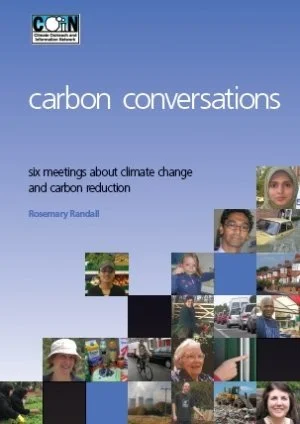CARBON CONVERSATIONS
Six friendly, practical meetings to help you halve your carbon footprint.
Carbon Conversations Groups offer a supportive group experience that helps people halve their personal carbon footprint. They deal with the difficulties of change by connecting to values, emotions and identity. The groups are based on a psychological understanding of how people change.
Groups of 6-8 members meet with trained, volunteer facilitators in homes, community centres, workplaces or other venues. The 6 meetings create a non-judgmental atmosphere where people are encouraged to make serious lifestyle changes. The groups offer: space for people to explore what climate change means for themselves, their families and their aspirations; permission to share their hopes, doubts and anxieties; time to work through the conflicts between intention, social pressure and identity; reliable, well-researched information and practical guidance on what will make a difference; support in creating a personal plan for change.
Carbon Conversations are normally divided into 6 sessions, typically of 2 hours each. 6-8 people meet with 2 facilitators. The meetings use professionally-designed, reliable materials to cover climate change basics, ideas for a low-carbon future and the four key areas of the footprint: home energy, travel, food and other consumption. Discussions of practicalities are woven together with discussions of how people feel and what these changes mean personally. Carbon reductions of 1 tonne CO2 are typically made by each member during the course, with plans developed to halve individual footprints over a 4-5 year period.
Basic facilitation training equips suitable volunteers to facilitate effective, stimulating groups.
Carbon Conversations’ primary audience is people who are aware of or who are becoming concerned about climate change (in Defra’s audience segmentation terms the 44% of the population who are ‘Positive Greens’ ‘Concerned Consumers’ or ‘Waste Watchers’). Although more aware of climate change than the average, these audiences do not have correspondingly small footprints. Involving other audience segments is also possible but is likely to require extended engagement activity first. Activities and games from the course can also be used as part of an engagement strategy with less aware audiences.
Group members can be recruited through outreach work, marketing, publicity, networking and by word of mouth. Any local community group with an active membership would be well placed to run a group.
Carbon Conversations was developed by Rosemary Randall at Cambridge Carbon Footprint.
COIN would like to thank APE for their grant towards our work on Carbon Conversations for 2012. We are very pleased to be taking this project forward, and every contribution will increase the number of groups that sit down to deal with the difficulties of climate change by connecting to values, emotions and identity in a non-judgmental atmosphere.
